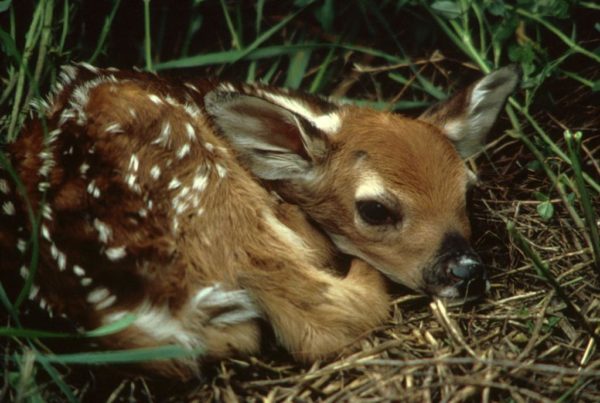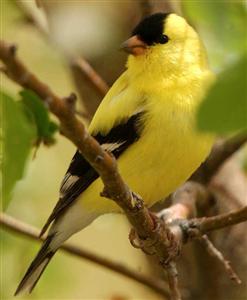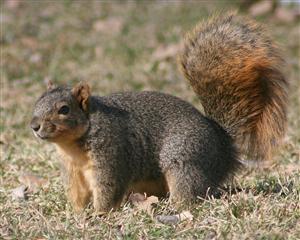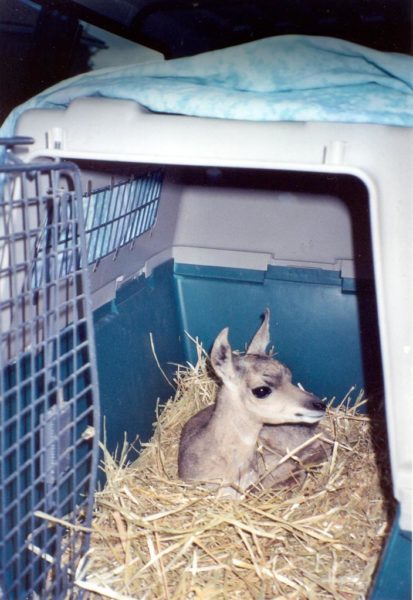Here in Colorado, we share our state with a wide variety of wildlife species. As our human population grows and expands into wildlife habitat, encounters with wildlife are becoming more common. If you find an injured animal, either on your property or while enjoying the outdoors, what should you do?
 First, observe the animal from a safe distance and make sure it really is injured. Often, baby animals are left alone while their parents are out searching for food. The babies can look especially vulnerable, so well-intentioned humans might think they are abandoned, orphaned, or injured. Most often, however, these babies are simply awaiting their mother’s return. If you find a baby animal on its own, the best thing you can do is leave it alone. Moving or touching the animal will confuse its parents and could cause more harm than good. Don’t feed baby animals, either – chances are, Mom is on her way back with food.
First, observe the animal from a safe distance and make sure it really is injured. Often, baby animals are left alone while their parents are out searching for food. The babies can look especially vulnerable, so well-intentioned humans might think they are abandoned, orphaned, or injured. Most often, however, these babies are simply awaiting their mother’s return. If you find a baby animal on its own, the best thing you can do is leave it alone. Moving or touching the animal will confuse its parents and could cause more harm than good. Don’t feed baby animals, either – chances are, Mom is on her way back with food.
If after observing an animal you determine it really is sick or injured, or if you witnessed something happen to a baby’s parents, there are several ways you can help.
Birds
 Because they are some of the most frequent wildlife we encounter, birds are also among the types of wildlife we’re most likely to find injured. Window crashes, attacks by cats, and vehicle collisions are among the most frequent causes of bird injuries. If you find a bird with a broken leg or wing, you can call or bring it to a licensed wildlife rehabilitation facility. (Colorado Parks & Wildlife has a list of facilities on their website.) To help prevent injuries to birds, keep cats indoors, and use screens on your windows. You can also purchase window decals that can help deter birds. However, if a bird does crash into your window, it could have internal injuries, so it is best to contact a wildlife rehabilitator if a stunned bird falls to the ground and doesn’t immediately get up and fly away.
Because they are some of the most frequent wildlife we encounter, birds are also among the types of wildlife we’re most likely to find injured. Window crashes, attacks by cats, and vehicle collisions are among the most frequent causes of bird injuries. If you find a bird with a broken leg or wing, you can call or bring it to a licensed wildlife rehabilitation facility. (Colorado Parks & Wildlife has a list of facilities on their website.) To help prevent injuries to birds, keep cats indoors, and use screens on your windows. You can also purchase window decals that can help deter birds. However, if a bird does crash into your window, it could have internal injuries, so it is best to contact a wildlife rehabilitator if a stunned bird falls to the ground and doesn’t immediately get up and fly away.
This is also the time of year for baby birds, and you might find one on the ground outside its nest. Does the bird have feathers? If so, it’s probably fledging (exploring and learning to fly), so it is best to leave it alone. Parents of fledglings are usually nearby, keeping a close eye on their chicks. Birds without feathers, however, are a different situation. These birds are too young and helpless to be out on their own, so if they are on the ground, they probably accidentally fell out of the nest. In this case, it is okay to pick up a baby bird and gently place it back in the nest, according to Audubon.
Mammals
 Like birds, squirrels and rabbits are among the animals that many of us encounter on a daily basis. And, like birds, they are vulnerable to a variety of injuries including vehicle collisions and attacks by cats and dogs. If you find an injured bunny or squirrel on your property, you can carefully transport it to a rehabilitation facility or, if you are uncomfortable picking it up, you can call Colorado Parks & Wildlife or a nearby rehab facility. If you do plan to transport the animal, place it in a dark, quiet, comfortable box or cage. Line the container with newspaper or a clean, smooth pillowcase – do not use fabrics like towels that could catch on the animal’s claws. And do not give the animal food, water, or milk, which can make it sick. If you are transporting an animal, it is still best to call the rehab facility first and follow their guidance.
Like birds, squirrels and rabbits are among the animals that many of us encounter on a daily basis. And, like birds, they are vulnerable to a variety of injuries including vehicle collisions and attacks by cats and dogs. If you find an injured bunny or squirrel on your property, you can carefully transport it to a rehabilitation facility or, if you are uncomfortable picking it up, you can call Colorado Parks & Wildlife or a nearby rehab facility. If you do plan to transport the animal, place it in a dark, quiet, comfortable box or cage. Line the container with newspaper or a clean, smooth pillowcase – do not use fabrics like towels that could catch on the animal’s claws. And do not give the animal food, water, or milk, which can make it sick. If you are transporting an animal, it is still best to call the rehab facility first and follow their guidance.
Some small mammals, however, should not be handled. These include bats, skunks, and raccoons – species that are susceptible to rabies. Injured animals can become aggressive in order to defend themselves, and rabies can easily be transmitted to humans if an animal were to bite. Therefore, Colorado Parks & Wildlife and the Colorado Department of Public Health and Environment strongly advise never picking up injured bats, skunks, and raccoons. Instead, call a rehab facility or Colorado Parks & Wildlife, and they will send a trained professional to assess the animal.
Larger animals, such as deer and elk, foxes, coyotes, and bears, can cause serious injuries to humans, so if you find an injured animal – whether on your property, on the road, or out on the hiking trail – your best option is to call Colorado Parks & Wildlife.
Reptiles & Amphibians
Many wildlife rehabilitation facilities are only licensed to care for birds and mammals, so if you find an injured reptile or amphibian, either contact Colorado Parks & Wildlife or check with your local rehab facility before transporting the animal to make sure they are able to treat it.
————
 Whatever the species, try to avoid bringing injured wildlife to a standard veterinary clinic, because these are usually only licensed to treat dogs, cats, and other domestic pets. Instead, when in doubt, contact Colorado Parks & Wildlife or a licensed wildlife rehabilitation center.
Whatever the species, try to avoid bringing injured wildlife to a standard veterinary clinic, because these are usually only licensed to treat dogs, cats, and other domestic pets. Instead, when in doubt, contact Colorado Parks & Wildlife or a licensed wildlife rehabilitation center.
All photos courtesy Colorado Parks & Wildlife
- How to Spot the Differences Between Eagles and Hawks - August 16, 2021
- How Transportation Projects Help Tell the Story of Colorado’s Past - August 9, 2021
- Time Machine Tuesday: The Night the Castlewood Canyon Dam Gave Way - August 3, 2021
